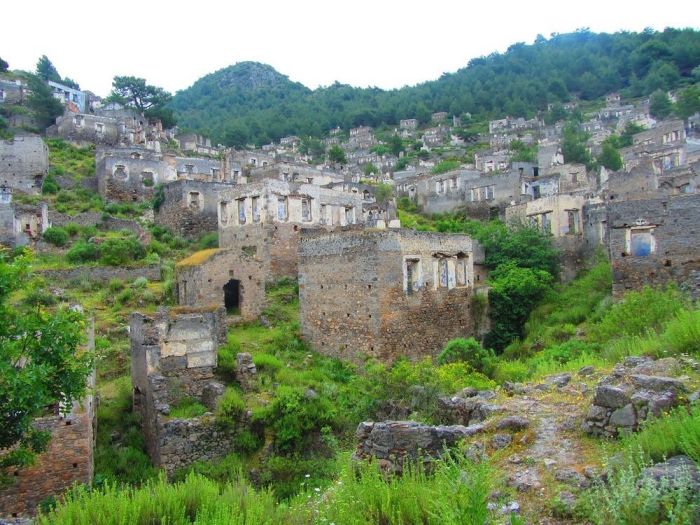|
|
Lebessos, Kayaköy, Fethiye, Turkey
|
Lebessus is mentioned as a Christian bishopric in the Notitia Episcopatuum of Pseudo-Epiphanius composed under the Byzantine Emperor Heraclius in about 640, and in the similar early 10th-century document attributed to Emperor Leo VI the Wise, as a suffragan of the metropolitan see of Myra, the capital of the Roman province of Lycia, to which Lebessus belonged. Since it is no longer a residential bishopric, Lebessus is listed by the Catholic Church as a titular see.
Livissi is probably the place where the inhabitants of Byzantine Gemiler Island fled to protect themselves from pirates. It experienced a renewal after nearby Fethiye (known as Makri) was devastated by an earthquake in 1856 and a major fire in 1885. More than 20 churches and chapels were built in the village and the plain (Taxiarhes - the 'Upper' church - and 'Panayia Pyrgiotissa' - the 'lower' church - St. Anna, St. George, etc.). Most of them are still standing in ruinous or semi-ruinous condition. The village population was over 6.000 people, according to Greek and Ottoman sources.
At the ending of the Greco-Turkish War (1919–1922), Kayaköy was already completely abandoned. The persecutions of Livissi inhabitants as well as Greeks of nearby Makri, were part of the wider campaign against all Ottoman Greeks and other Christians of the Empire. The persecutions in the area started in 1914 in Makri. In 1916, a letter in Greek addressed to Sir Alfred Biliotti, the Consul General of Great Britain at Rhodes, explained the murders and persecution of Livissi and Macri Greeks who asked him for intervention. Unfortunately, the letter was intercepted at Livissi by Turkish authorities. Later that same year, many families of Levissi were deported and driven on foot to Denizli, around 220 km away. There, they suffered various extreme atrocities and tortures, facing even death.
Two more exile phases followed in 1917 and 1918. In 1917, families were sent in villages near Denizli, such as Acıpayam, through forced march of fifteen days, consisting mainly of the elderly, women and children, who had remained in the area. During that death march, the roads were strewn with bodies of dead children and the elderly who succumbed to hunger and fatigue. The exiles of the next year were no less harsh. In September 1922, the few remaining Greeks of Livissi and Makri abandoned their homes and embarked on ships to Greece. Some of them founded Nea Makri (New Makri) in Attica.
|
|









